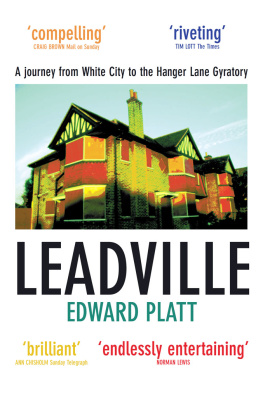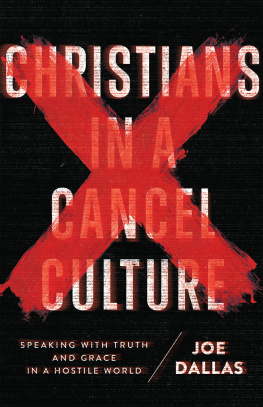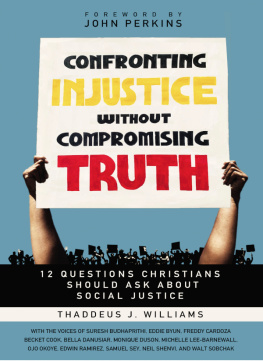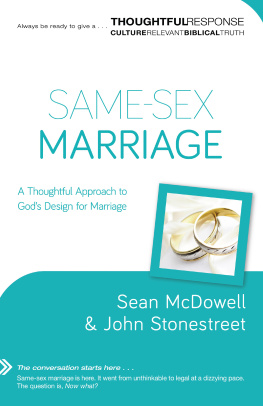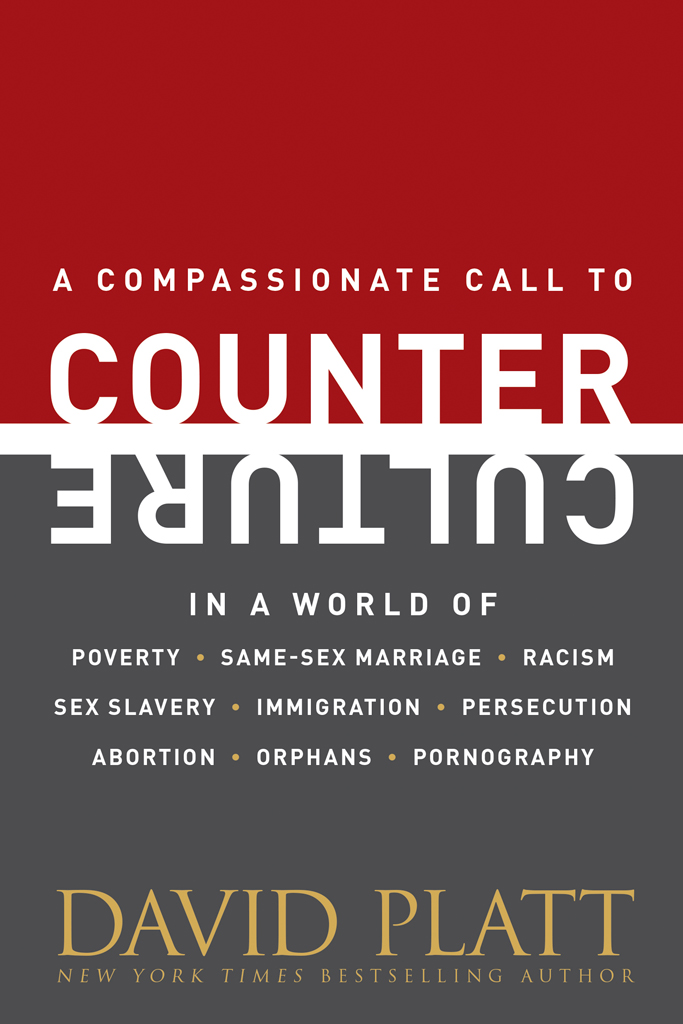Visit Tyndale online at www.tyndale.com.
TYNDALE and Tyndales quill logo are registered trademarks of Tyndale House Publishers, Inc.
Counter Culture: A Compassionate Call to Counter Culture in a World of Poverty, Same-Sex Marriage, Racism, Sex Slavery, Immigration, Abortion, Persecution, Orphans, and Pornography
Copyright 2015 by David Platt. All rights reserved.
Designed by Dean H. Renninger
Published in association with Yates & Yates (www.yates2.com).
Unless otherwise indicated, all Scripture quotations are taken from The Holy Bible, English Standard Version (ESV), copyright 2001 by Crossway, a publishing ministry of Good News Publishers. Used by permission. All rights reserved.
Scripture quotations marked NIV are taken from the Holy Bible, New International Version, NIV. Copyright 1973, 1978, 1984 by Biblica, Inc. Used by permission. All rights reserved worldwide.
Scripture quotations marked HCSB are taken from the Holman Christian Standard Bible, copyright 1999, 2000, 2002, 2003, 2009 by Holman Bible Publishers. Used by permission. Holman Christian Standard Bible, Holman CSB, and HCSB are federally registered trademarks of Holman Bible Publishers.
Scripture quotations marked NASB are taken from the New American Standard Bible, copyright 1960, 1962, 1963, 1968, 1971, 1972, 1973, 1975, 1977, 1995 by The Lockman Foundation. Used by permission.
Scripture quotations marked NKJV are taken from the New King James Version, copyright 1982 by Thomas Nelson, Inc. Used by permission. All rights reserved.
Library of Congress Cataloging-in-Publication Data
Platt, David, date.
Counter culture : a compassionate call to counter culture in a world of poverty, same-sex marriage, racism, sex slavery, immigration, abortion, persecution, orphans, and pornography / David Platt.
pages cm
Includes bibliographical references.
ISBN 978-1-4143-7329-4 (hc)
1. Christian life United States. 2. Christianity and culture United States. 3. Culture conflict Religious aspects Christianity. I. Title.
BV4501.3.P628 2015
261.0973 dc23 2014038804
ISBN 978-1-4964-0104-5 (International Trade Paper Edition)
All of the authors royalties from this book will go toward promoting the glory of Christ in all nations.
Build: 2015-07-10 10:01:17
To all who long and work for justice and mercy in the world
while loving and proclaiming the Judge and Savior of the world
THE GOSPEL
The good news that the just and gracious Creator of the universe has looked upon hopelessly sinful men and women and has sent his Son, Jesus Christ, God in the flesh, to bear his wrath against sin on the cross and to show his power over sin in the resurrection, so that everyone who turns from their sin and themselves and trusts in Jesus as Savior and Lord will be reconciled to God forever.
INTRODUCTION
COUNTERING CULTURE
Imagine standing at the height of all the earth and seeing the depth of human poverty.
Journey with me to the middle of the Himalayan mountains, where not long ago I met men and women striving for survival. Half the children in these particular villages die before their eighth birthday. Many dont make it to their first. Meet Radha, a mom who would have fourteen kids if twelve of them hadnt died before adulthood. Meet Kunsing, a disabled child who spent the first twelve years of his life chained in a barn because his family thought he was cursed. Meet Chimie, a toddler whose brother and sister died when he was two months old, leading his mom to commit suicide and his dad to pass him around desperately to any woman in the village who could provide nourishment.
Just as shocking as those you meet are those you dont. Some of the villages in these mountains are virtually devoid of young girls between the ages of five and fifteen. Their parents were persuaded by the promises of a better life for their daughters, so they sent them off with men who turned out to be traffickers. Most of these girls live to see their eighth birthday, but by their sixteenth birthday they are forced to have sex with thousands of customers. They will never see their families again.
When we meet people, hear stories, and see faces of injustice like this around the world, it is altogether right for us to respond with compassion, conviction, and courage. Compassion overwhelms us because we care deeply for children, parents, and families whose lives are filled with pain and suffering. Conviction overtakes us, for every one of us knows instinctively that stories like these should not be so. It is not right for half the children in these Himalayan villages to die before their eighth birthday. It is not fair for children born with disabilities to be chained in barns for their entire lives. It is unjust for pimps to deceive parents into selling their precious daughters as sex slaves. Ultimately, such compassion and conviction fuel courage courage to do something, anything, for the sake of Radha, Kunsing, Chimie, these girls, their parents, their villages, and countless other children, women, and men like them around the world.
In light of these global realities, I am greatly encouraged when I see such compassion, conviction, and courage in the church today. As I listen to the way contemporary Christians talk (especially, though not exclusively, younger evangelicals), I perceive fierce opposition to injustice regarding the poor, the orphan, and the enslaved. I observe increased awareness of social issues: a plethora of books written, conferences organized, and movements started that revolve around fighting hunger, alleviating poverty, and ending sex trafficking. In the middle of it all, I sense deep dissatisfaction with indifference in the church. We simply arent content with a church that turns a blind eye and a deaf ear to the realities of social injustice in the world. We want our lives and the church to count for social justice.
Yet while Im deeply encouraged by the expressed zeal of so many Christians for certain social issues, Im profoundly concerned by the lack of zeal among these same Christians (especially, though again not exclusively, younger evangelicals) for other social issues. On popular issues like poverty and slavery, where Christians are likely to be applauded for our social action, we are quick to stand up and speak out. Yet on controversial issues like homosexuality and abortion, where Christians are likely to be criticized for our involvement, we are content to sit down and stay quiet. Its as if weve decided to pick and choose which social issues well contest and which well concede. And our picking and choosing normally revolves around what is most comfortable and least costly for us in our culture.
If you ask practically any popular Christian leader in the public square to make a statement on poverty, sex trafficking, or the orphan crisis, that leader will gladly, boldly, and clearly share his or her convictions. However, if you ask the same Christian leader in the same public setting to make a statement on homosexuality or abortion, that leader will respond with either nervous hesitancy or virtual heresy, if he or she responds at all. Thats not the issue Im concerned with, the leader might say. My focus is on this other issue, and thats what I want to speak about.
The practical effect of this is evident across the contemporary Christian landscape. All sorts of younger evangelicals write blogs, take pictures, send tweets, and attend conferences where they fight to alleviate poverty and end slavery. Other evangelicals care for foster children in the United States and adopt orphans from around the world. Many of these efforts are good, and we should continue in them. What is problematic, however, is when these same evangelicals stay silent in conversations about more culturally controversial issues like abortion or so-called same-sex marriage.




